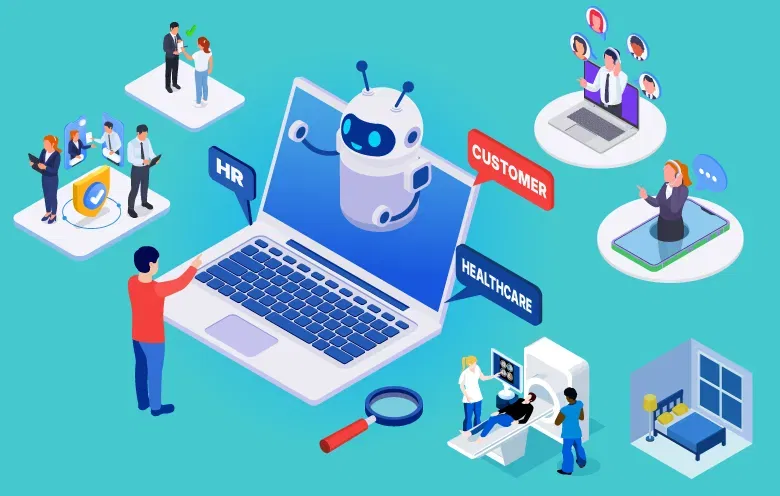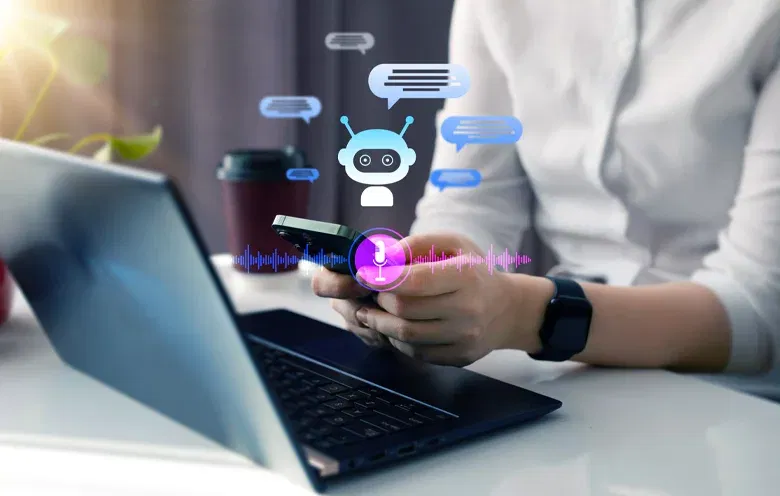Hello everyone!
And a very good day to all of you!
I am Ahmed Zubair, Subject Matter Expert for Softweb Solutions – An Avnet company.
As part of our digital transformation series – in today’s podcast we will be talking all about AI-powered chatbots with cognitive capabilities that result in improved customer experience.
Such AI-powered chatbots are one of the key investment areas under customer experience for all industries which disrupt the way enterprises work and communicate with their customers. I will also talk about how these chatbots provide a holistic digital solution that cuts across the customer life cycle and improves overall customer experience.
Since the pandemic of COVID-19 is ongoing, organizations are struggling to set up frameworks for handling assistance jobs. Perhaps many organizations are under pressure to keep their operations lean during this pandemic and that’s exactly how an AI-powered chatbot with cognitive capabilities can help with. It helps in streamlining your operations as well as interacts with your customers and assist them with information at their fingertips.
Before knowing about AI-powered chatbots let’s see the current scenario of customer experience. Companies are spending billions of dollars on customer acquisition, but it is not worth it until they offer a great customer experience. So I can say that customer experience is more than just customer service.
It includes a personalized customer approach, establishing a lasting relationship, and support availability round the clock.
The customer experience challenges that enterprises face
Now let’s see how consumers can get annoyed with a poor customer experience. The website search function may not be useful, they may come across poorly designed apps, or perhaps it takes too long to find information on products or services. At times, it may even be difficult to find basic business details, or they may not be getting answers to simple questions. Last, but not the least, are some hard-to-navigate websites that give a tough time to the users.
We are living in a digital age where contextual conversation and omnichannel engagement has become the need of the hour to build customer loyalty, and therefore it is a must to develop an AI-powered chatbot integrated with cognitive capabilities.
You may ask, after all, what can such a chatbot offer?
A chatbot offers a better conversational experience if it is powered by artificial intelligence. With AI & cognitive technologies, it can understand user content, intent, reasons, while learning and interacting smartly with human beings based on programmable systems.
These technologies enable your apps to see, hear, interpret, and interact in more human ways. Therefore, combining a chatbot with cognitive services and overlaying it with customized data analytics capabilities can provide your enterprise with rich insights and discoveries to make business decisions effortlessly.
A well-constructed AI-powered chatbot should be able to make sense from messy unstructured data – meaning any raw data that is lying somewhere in your systems. It can help you to transform customer engagement, improve decision-making, and deploy self-learning capability that can hugely benefit business processes that use this data.
Now, let’s talk about the capabilities of a cognitive chatbot
When integrated with artificial intelligence it can simulate certain human-like functions and when instilled with speech recognition, it can translate spoken languages into text.
Then we have machine learning using which bots can learn and improve without special instructions and natural language processing that understands human speech as it is spoken.
Followed by deep learning that helps to achieve machine learning with artificial neural network algorithms and text analysis to extract and analyze customers’ feedback for valuable insights.
And that’s not all, these chatbots can also be integrated with recommendation engines to analyze data and suggest something based on user’s interest. And finally, the sentiment analysis to help with identifying and categorizing opinions expressed in a text or verbal communication.
As we shared the capabilities of cognitive-powered chatbots now let us learn more about its dynamic features. Entity recognition, intent recognition, omnichannel support, dialog management, advanced contextual capabilities, predictive nature, human-like approach are some of the cutting-edge features of smart chatbots, which can offer enterprises more advanced as well as contextual capabilities to increase customer experience.
SUBSCRIBE TO OUR PODCAST
Now let’s hear a few use cases for various industries
These will demonstrate how different industries can benefit from AI-powered cognitive chatbot development for their business operations.
For instance, the banking sector can offer more personalized customer experience to their customers using an AI-powered cognitive chatbot. The bot can help their customers to send instant alerts to customers about potential fraud or an unusual transaction, answer customer queries related to account balance, transactions, and more, anytime, anywhere. Besides, it can also provide advice related to loans and mortgage to customers as and when needed.
This can help to promote loyalty programs and rewards customers with a point system or offers and get financial guidance regarding investments and savings.
AI-powered cognitive chatbots are very useful for the healthcare and pharma sector to improve patient care. Here’s what a bot can help you with – it can assist in scheduling medical appointments with specific doctors, send reminders to patients before the checkup, medications, follow-ups. Not just that, it also helps to refill prescribed drugs and answer health insurance-related queries too. And it can help to store patient information and provide records to doctor as and when needed as well as help patients to diagnose the disease that they may have by analyzing their current symptoms. I am certain that the healthcare and pharma industry will go through a huge transformation as they decide to leverage AI-powered chatbot with cognitive capabilities.
And do you know that industries such as hospitality rely more on customer engagement than others? This sector can greatly benefit from hospitality chatbot.
These sectors are the ones that are most affected by the current pandemic. When the situation becomes normal and when travel and hospitality resumes its operations, they will need AI-powered chatbot with cognitive capabilities to easily engage with their customers and once again encourage them to live with the new normal.
AI-powered chatbot that is infused with cognitive capabilities can help customers with upcoming flights, hotel rates, sightseeing tours, booking, services, and more. It can also provide instant answers for free city guides, tour promotions, bookings, travel planning and management, car rentals, emergency, and more. Do you know that traveling biggies like Expedia, Booking.com, SkyScanner, British Airways, Hyatt Hotels, Uber, etc. use chatbots to provide a safer yet meaningful experience to their customers? Also, when you integrate a chatbot with your product catalog it can help to present information about hotel rooms, flights, attractions, car rentals, bundled packages, and more. Wouldn’t your customers love such experiences? At least, I personally would love it.
How industries can redefine their customer experiences
I have just shared with you how useful AI-powered cognitive chatbots can be for your organization, and if you wish to transform your customer experience rapidly then adopting a AI-powered chatbot with cognitive capabilities can go a long way. Some of the ways include – seamless live chat support chatbots are helping businesses save on customer service costs by speeding up response times. And the seamless live chat user interface connects customers with the brand easily without them having to go through annoying IVR (interactive voice response) – which I think is a major relief!
Besides, a chatbot personifies your brand outstandingly, enabled proactive customer interaction which gives a more personalized customer experience to consumers. Also, the data that the chatbot gathers can be used by the organization to identify customer behavior, recommend preferred products, upsell and cross-sell, and make better business decisions.
Amazing present-day scenarios
Let’s understand how this works altogether, by looking at some present-day scenarios –
1. Bank of America
In 2018, Bank of America launched Erica. This chatbot helps users check their balance, remind users about their bills, and answer a variety of banking-related questions. Interestingly, there are three ways to communicate with Erica: by voice, text, or gesture.
2. H&M
In 2017, H&M launched an AI chatbot that was customized towards providing a personal shopping experience. It achieves this by asking users a series of fashion-related questions. Users simply choose answers from photo options, resulting in a personal style profile. This intelligent chatbot also recommends new products to customers, sends receipts as well as remembers a customer based on their IP addresses
3. Starbucks
Starbucks makes it extremely easy to place an order for your favorite drink or snack, whether you prefer using voice commands or text messaging. The chatbot will tell you when your order will be ready along with the total cost. The best thing about this bot is that it evaluates customer preferences and habits based on previous orders and recommends options accordingly.
4. Sephora
You can get all kinds of makeup tutorials if you chat with Sephora on Kik. This personal assistant helps in providing product reviews and ratings when a customer is shopping in a store. Also, Sephora bot helps customers with makeup tips and tutorials. It also assists customers to find the exact products used in the tutorials and recommend top-rated cosmetic brands.
In conclusion,
Without a shadow of a doubt, chatbots with cognitive technologies are key in an organization’s digital journey and can deliver next-generation intelligent customer service. I will say that AI-powered chatbots are transforming the customer experience to a great extent, and more and more companies are embracing them as they believe a cognitive capabilities is a tool to address their current customer experience challenges.
With this, I would like to wrap up the podcast. Thank you for your attention and I hope it helped you make up your mind for investing in an AI-powered chatbot integrated with cognitive capabilities this year, which has been a roller-coaster for all of us. If you have questions, you can contact me via email address info@softwebsolutions.com. I would be more than happy to help.
Stay tuned for our next episode on digital transformation series. Stay safe!




